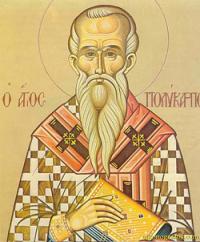
Feast day: 23 February
There is little known about St Polycarp except for the account of his martyrdom. His name means "much fruit." There are two main sources of information about his life: the Letter of the Smyrneans, recounting his martyrdom, and a passage from Irenaeus, Against Heresies. Other sources include the epistles of St Ignatius of Antioch, which included one to Polycarp, and Polycarp’s own letter to the Philippians. In 1999 some third– to sixth-century fragments about Polycarp were also published. Polycarp is important because he is a link to apostolic times. His friend Irenaeus, who was born in the first quarter of the second century AD and who witnessed his journey to martyrdom, maintained that Polycarp had known the Apostle John. In his letter to Florinus he stated that he saw and heard Polycarp personally in lower Asia:
I could tell you the place where blessed Polycarp sat to preach the Word of God. It is yet present to my mind with what gravity he everywhere came in and went out; what was the sanctity of his deportment,the majesty of his countenance; and what were his holy exhortations to the people. I seem to hear him now relate how he conversed with John and many others who had seen Jesus Christ, the words he had heard from their mouths.
Irenaeus was faced with heresies like docetism which denied the true humanity of Christ. It was important to him that the direct contact with apostolic tradition was maintained: people like Polycarp and Clement, therefore, who had known the apostles provided an authentic continuity. Polycarp himself preached against docetism in his letter to the Phillipians:
For whoever does not confess that Jesus Christ has come in the flesh, is anti-Christ, and whoever does not confess the testimony on the cross, is of the devil; and whoever perverts the oracles of the Lord to his own lusts, and says that there is neither a resurrection or a judgement, he is the first born of Satan.
The letter also gives moral advice to particular groups of people such as husbands, widows and presbyters.
St Jerome who lived in the fourth century AD claimed that Polycarp had been made bishop of Smyrna by John. It is recorded also by Iraneus that Polycarp visited Rome to discuss the timing of the Easter Festival with the Pope. They came to a compromise: the Western church would continue to celebrate Easter on the first Sunday after the full moon but Polycarp was allowed to celebrate it at the time of the Jewish Passover regardless of the day of the week on which it fell.
Polycarp’s martyrdom was described in the letter from the Church in Smyrna to the Church of Philomelium. It is said that he had a vision of his pillow being on fire and knew then how he would die. The Christians were often singled out for persecution because they refused to worship the Emperor; Polycarp hid but was betrayed and captured. He actually gave food to his captors. The Proconsul tried to persuade him to curse Christ, but Polycarp replied:
Fourscore and six years have I served him and he has done me no wrong. How can I blaspheme my king and saviour?
It was too late to throw him to the wild beasts, so it was decided that he should be burnt alive; the flames, however, formed a wall round him and he was unharmed. The executioner then stabbed him.
Polycarp, Ignatius and Clement are regarded as the chief Apostolic Fathers
St Polycarp, bishop and martyr, pray for us.